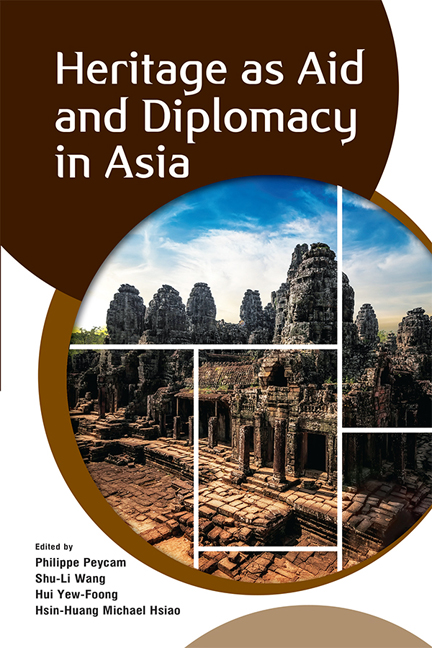Book contents
- Frontmatter
- Contents
- Contributors
- 1 Heritage as Aid and Diplomacy in Asia: An Introduction
- 2 World Heritage and WikiLeaks: Territory, Trade and Temples on the Thai-Cambodian Border
- 3 Heritage Making – Aid For Whom? The Genealogy of Expert Reports in the Hands of Politics and Their Impact in the Case of Preah Vihear
- 4 The International Coordinating Committee for Angkor: A World Heritage Site as an Arena of Competition, Connivance and State(s) Legitimation
- 5 Legacies of Cultural Philanthropy in Asia
- 6 To Help or Make Chaos? An Ethnography of Dutch Expertise in Postcolonial Indonesia
- 7 Heritage Conservation as a Tool for Cultural Diplomacy: Implications for the Sino-Japanese Relationship
- 8 From Ideological Alliance to Identity Clash: The Historical Origin of the Sino-Korean Goguryeo Controversies
- 9 Nationalism, Politics and the Practice of Archaeology in Afghanistan: A Case Study of Bamiyan
- 10 Disappearing Voices: The Politics and Practice of Safeguarding Kunqu Opera in the People’s Republic of China
- 11 Neoliberalizing Heritage: International Agencies and the Local Dynamics of Heritage Conservation in Bali, Indonesia
- 12 Heritage Conservation as Trickle-Down Development
- Index
11 - Neoliberalizing Heritage: International Agencies and the Local Dynamics of Heritage Conservation in Bali, Indonesia
Published online by Cambridge University Press: 10 November 2020
- Frontmatter
- Contents
- Contributors
- 1 Heritage as Aid and Diplomacy in Asia: An Introduction
- 2 World Heritage and WikiLeaks: Territory, Trade and Temples on the Thai-Cambodian Border
- 3 Heritage Making – Aid For Whom? The Genealogy of Expert Reports in the Hands of Politics and Their Impact in the Case of Preah Vihear
- 4 The International Coordinating Committee for Angkor: A World Heritage Site as an Arena of Competition, Connivance and State(s) Legitimation
- 5 Legacies of Cultural Philanthropy in Asia
- 6 To Help or Make Chaos? An Ethnography of Dutch Expertise in Postcolonial Indonesia
- 7 Heritage Conservation as a Tool for Cultural Diplomacy: Implications for the Sino-Japanese Relationship
- 8 From Ideological Alliance to Identity Clash: The Historical Origin of the Sino-Korean Goguryeo Controversies
- 9 Nationalism, Politics and the Practice of Archaeology in Afghanistan: A Case Study of Bamiyan
- 10 Disappearing Voices: The Politics and Practice of Safeguarding Kunqu Opera in the People’s Republic of China
- 11 Neoliberalizing Heritage: International Agencies and the Local Dynamics of Heritage Conservation in Bali, Indonesia
- 12 Heritage Conservation as Trickle-Down Development
- Index
Summary
For Indonesia, culture as a means of economic development has recently become an important policy issue in development discourse and practice. Given the country's richness and diversity of cultural heritage, the deputy to the Indonesian minister of education and culture, Wiendu Nuryanti, claimed that Indonesia is a “cultural superpower state” (negara adidaya secara budaya). In order to show its leadership in cultural diplomacy, the government of Indonesia took the initiative of organizing the World Cultural Forum in November 2013, in Bali, as the first multilateral conference to build global partnership around culture-based development. Following the forum, in December 2013 the United Nations adopted Resolution No. 68/233 on Culture and Sustainable Development, which embraces an instrumentalist notion of culture by emphasizing its contribution “to inclusive economic development, since cultural heritage, cultural and creative industries, sustainable cultural tourism and cultural infrastructure are sources of income generation and job creation”. In the previous year, the deputy minister also led the Indonesian delegation to the UNESCO World Heritage Committee meeting in St. Petersburg, Russia, where nomination of the Cultural Landscape of Bali Province was finally approved as a World Heritage Site.
For both the World Cultural Forum and the approval of Indonesia's first World Heritage cultural landscape, Bali was the centre of gravity. Not only because Bali's cultural heritage is regarded as a national asset (UNDP, USAID and the World Bank 2003) but also because the island is the international gateway for Indonesia. Since the Dutch colonial era, Balinese culture has been an object of preservation in the service of the development of tourism. More recently, cultural heritage conservation projects for Bali have been promoted and supported by international agencies, including the World Bank and UNESCO. In these projects, the old discourse and practices of the conservation of Bali's cultural heritage, a concept Schulte Nordholt (2008) asserts was “invented” by Dutch Colonial authorities and scholars, has been brought into new structural settings. Not only has the global economic system been restructured, the Indonesian state has been transformed substantially from a colonial state to a developmental state, and more recently to a neoliberal regulatory state where the relations between the state, market and civil society in the heritage conservation sphere are redefined.
- Type
- Chapter
- Information
- Heritage as Aid and Diplomacy in Asia , pp. 278 - 304Publisher: ISEAS–Yusof Ishak InstitutePrint publication year: 2020

